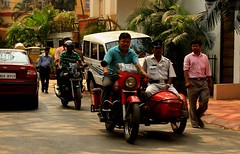 Where GMO food is a major concern for the public and environmentalists in other countries, in India, the environment minister seems to be a comfortable supporter of the government’s eagerness to open the floodgates to GMO vending corporations!
Where GMO food is a major concern for the public and environmentalists in other countries, in India, the environment minister seems to be a comfortable supporter of the government’s eagerness to open the floodgates to GMO vending corporations!
Geneticist Suman Sahai, founder of Gene Campaign in India, in her recent interview warns the nation of the dangers of GMO and lists the following reasons why (in her words) India does “not have the competence to play around with GMO food.”
1. No technological expertise: Our biosafety (prevention of risks associated with biotechnology processes) competence has not improved at all. We need officials trained in genetics who can understand the biosafety data. We have none.
2. No proper field trials: The GMO crop trials are understood [but] nobody follows them. Take the trials of Bt rice conducted in Jharkhand in 2004. We found that one of the farms was in the midst of the farmers’ fields. No signboard, no fencing, no containment of any sort. One farmer put in charge of it had been threshing the produce and may have even eaten it. Later we found volunteer plants (those that grow on their own) had come up on the farm. We sent them for testing and of course they were GM.
3. Government corruption and greed: When we informed the Genetic Engineering Appraisal Committee (GEAC) that Jharkhand has the highest genetic diversity of rice and such lapses contaminate everything, they sent us a showcause notice for entering the field instead of taking action against shoddy trials.
4. Danger of losing biodiversity: Both brinjal and mustard [two crops India are allowing in] are cross-pollinating plants, so the consequences will be no single, non-GM mustard or brinjal left. Some say you can segregate, but have we managed to segregate Bt cotton? It has gone everywhere.
5. Larger impact on the environment: Uniformity of biodiversity will have its own environmental implications. There is a well-known phenomenon called gene silencing. Very often plants altered genetically don’t survive because you have interrupted the natural process. Those that do survive, certain genes may stop expressing. What can get silenced we have no idea. Yet we are ready to risk the entire germplasm.
6. Risk of Toxicity in food: Brinjal belongs to the Solanaceae family. It’s the family of not just tomato, chilli and potato but also datura (angel’s trumpets) and belladona. These are some of the most toxic plants. We can’t (more…)














